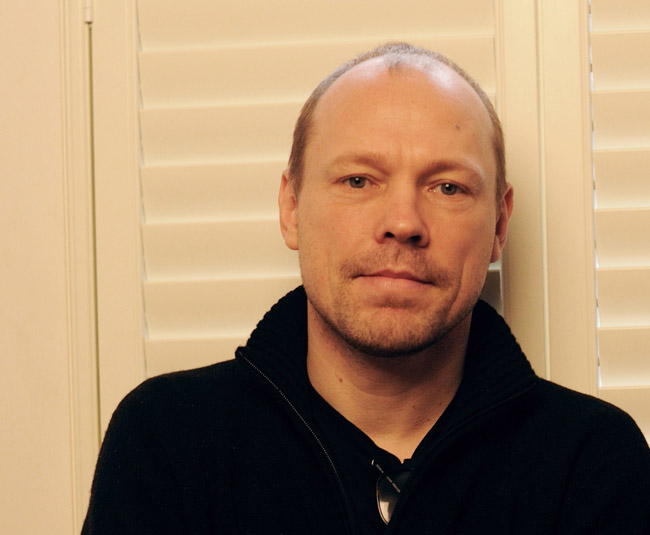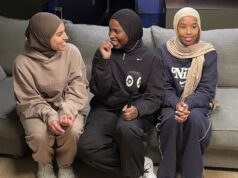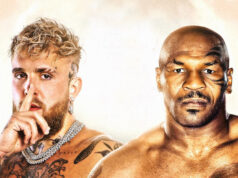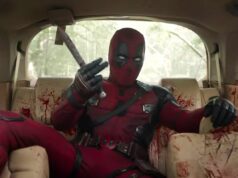An intimate tale of love and revenge, LOVE/ME/DO is the first feature of award-winning writer/director Martin Stitt whose shorts have screened in Venice and Sundance as well as being nominated for a British Independent Film Award.
We spoke to writer/director Martin Stitt about the film where he divulged his casting process, peoples reactions to the film and more.
Love/Me/Do is romantic but also at certain points tense and uneasy with the characters. How did you get that balance between the two?
I was looking to write something which I could get made and I’ve written bigger projects which needed more finance and ironically I did this thinking I do this by myself. I spent a lot of time thinking over the years ‘how can I do a film that’s self-contained?’. I love the old Terrance Malik ‘Badlands’ kind of films and Bonnie and Clyde. As I explored the themes I was interested in, I realised I really wanted to do a really good female-driven story. I knew it had to be self-contained so the more I thought about it, the more I thought she’s got to be the hero and the villain at the same time.
I’ve been really lucky [as part of my] evolution as a film-maker, I’ve had quite a few careers en route. I’ve spent time in investment banking, I’ve been in the military, and now I’m a film-maker. I was intrigued in why certain people do certain jobs. I’ve always felt a bit like an outsider looking in. Why do people succeed? The more I sort of realise there’s these character traits like the corporate sociopath. It made me really think: you see a lot of films about psychopaths who are male; you seldom see a female sociopath and if you do, she’s also nuts a bit like Glenn Close in Fatal Attraction. They tend to become a bit of a caricature but what are they really like? I sit a lot of these jobs and I come across people who are sort of sociopathic – psychopathic I guess in a sort of corporate sense – and they’re actually really lovely to be around until you’re no longer of use to them and they spurn you. You can’t tell they’re such nuts so I thought let’s base [the film] in real life. So I think it’s that sort of amalgamation that triggered it off with a strong female lead. I really like this Hitchcockian idea of setting these characters up where hopefully people are drawn to them – like maybe too strong a word but certainly hopefully they’d like them but also hate them. That’s a bit more like real life – one minute you like someone, next minute you hate them and then you like them. That’s where the genesis of the idea came from. I thought okay let’s show a woman as a character who is more fully drawn than a caricature or a cliché, something really strong to bite into.
I knew that I effectively wanted to have two evil people which we liked as in, they do something and we question why we like them. To me, what was the worst thing to do? How can I get an audience to like them and some to not like them, Or maybe to understand them? Because what they do is absolutely reprehensible. What was interesting was, I sent out the scripts and I figured I must’ve hit upon something as I had people turn around and say that they want them [the characters] to get away with it. I like that you do know what they’ve done and you think ‘I’ve got a problem with that’. So that was a long-winded way but it was a long gestation and I think it was this obsession with, in simple terms, the darker character traits and how people like that can survive and be generally nice people but also let’s make it a female driven piece. It’s almost like a role-reversal: she’s much more conventionally the guy role and he’s much more conventionally the girl role in some respects but it is a real zeitgeist. I see relationships like this albeit not committing the crime but a lot of guys are doing aspirational things and a lot of women are doing the pragmatic things. Quite a few of my males friends talk about having kids before their wives or girlfriends are even contemplating it, their career minded. There is this gender reversal to a degree these days.
How did you go about casting the roles of Antonia and Max? What were you looking for in the people playing them?
I was looking for two people who really were going to commit to it, who really got the characters, and in a weird way, don’t act. Or such good actors, it doesn’t come across as acting. I was really lucky that we had such great casting director called Manny Puro and as you can imagine for an indie film, you never really know what kind of level of actor or actress might be attracted to you project. Its great working with him, he has amazing perseverance as we auditioned actors. He was great; he brought in some pretty high profile actors which was a delight to me but some of them probably best known to an audience just didn’t quite have what I was looking for. Perhaps there was a sense of slight restlessness of them or maybe they weren’t hungry enough. Then we came across Rebecca and she has an amazing intensity and a very still presence. And she so wanted to do it! It wasn’t just that, it was this combination. How to get it right was, I basically cast her to start off with and then looked for the male lead. We had a bunch of great male actors come in. We did a final audition with three who were all really good.
It’s the chemistry between two actors which really can knock it out the park. I’d say, when we got Jack in the room it felt dangerous. I think she was slightly unnerved. He’s a great, crazy character, did a great audition and was quite happy to always push boundaries. The other two actors were really good as well but there was physicality between Jack and Rebecca which really worked for the piece. They’re also like brother and sister in a creepy sense – they do look compatible together. I remember asking afterwards ‘don’t tell me which of the actors you like, just tell me your emotional reaction to them’. And I think she felt a bit unsettled by Jack and I liked that. I could see as an actress she was going to rise to it. Both were able to prod each other’s buttons. They got on really well on the set. I have to say, there were times where it was fantastic: you’d give one a note to improvise something and it would really surprise the other. I think that was it for me; it was that serendipity. You have to trawl through people until you find those two which you believe are very honest, understood the role and had a physicality that I believed worked [well] together. We only had three weeks to shoot and also for two characters to really hold our attention for the duration was very risky. I had quite a few people in the industry say ‘you can’t do this film for loads of reasons.’ ‘You can’t use shoot in the house.’ ‘How are you going to get a cast to hold our attention?’ ‘We don’t really like the characters when we read the script. They’re not nice.’ I felt like they were all missing a trick and that was the danger of it because there were moments in the script where they do things which we enjoy – that was the challenge. It was fun, very risky.
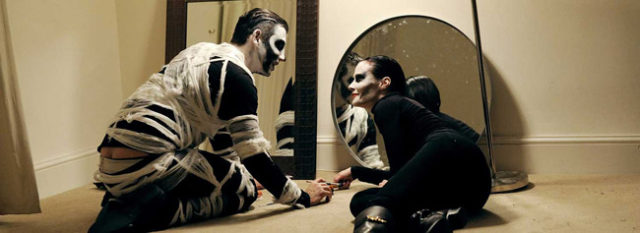
Were there any changes from paper to screen?
The thing is, [with] a script, you put a lot more detail in there purely because there are so many different departments reading it: the producer, agents, and cinematographer. If anything we took things out we shot in the edit. You don’t know what the chemistry is going to be like between your actors; there are little things they can do with a look. Strangely enough, the film is pretty much what the script was other than taking things out. We didn’t really add anything in.
It’s the surprises your actors give you. I do a scene in slightly different energies, tempos or with different emotions to give me a choice in the edit. I think that was the beauty of it, they really embraced it. There wasn’t one way of being very prescriptive because it is this fluid, dynamic relationship. We sense that he might need to get angry in this scene, so you do a version like that. You don’t know quite how angry so you ask Jack. And then, just to give you a choice, [we] don’t do it in an angry way, [we] do it in a relaxed way because you’re looking to see what’s real. I think that’s where the two actors where so beautifully generous because they quite happily embraced that rather than getting fixed on one thing; it was massively collaborative. Interestingly enough, there were quite a lot of people who were scared about just shooting in a house for 90 minutes. There are only so many places you can put a camera. I was really lucky; I had an idea of what I wanted to do using quite simple film grammar. I refused that there were only so many places you could out a camera. There are so many different lenses you can put on it, focal settings, the blocking – suddenly you have a multitude of ways to communicate and if you keep it simple with a simple plan, it can be quite complex. Robin, our cinematographer, did a brilliant job. He moved very quickly, had a great eye, brilliant with natural lighting and augmenting that. He got the idea that we’d have quite a simple plan: a strong character would be on the left of the frame, a weak character on the right. We wouldn’t shoot them in two shots that much at the start because they weren’t a couple but towards the end, you’ll see there’s an evolution: they’re shot a lot more in one-take or with a few cuts whereas it’s quite ‘cutty’ relatively speaking for some of the earlier scenes. Keeping those rules together, it gives it a simple grammar but it makes it much more complex. I had one person complement the use of space in the shooting. They drew reference to the moments when they come downstairs and he said [that] he’d completely forgotten about the space and in that moment [he] still didn’t know the geography of the place and it kept [him] intrigued still further! That was a deliberate gambit there not to use Steadicam so you know the whole space and therefore you know where people are. There’s always a case of shooting it in a way so it would slowly reveal and even by the end you might not fully understand the layout of the house but you have been shown the full layout of the house.
Have people reacted to your film in the way you expected?
Yeah and no. I try not to presume. I wanted to do a film which would keep people guessing. I had script developers saying ‘you’ve got to tell us this’. First of all, I knew I couldn’t leave the house. I had script developers say ‘just take us out once’. As soon as you do that, the whole concept of the film falls apart. I really wanted audiences to be active so it was never clearly stated exactly what they were doing but you work it out. If we tell them to sit down and do that expositional thing you see in most blockbuster feature films where they say ‘we’re going to attack the Deathstar’, all explanatory – we don’t tend to do that in real life. We kind of understand what the person’s doing, we talk about the details which might not be clear to outsiders [but] we can still start to figure out what’s going on. So yeah, first of all, I really wanted the audience to be active and I’ve had people say ‘when I first started watching the movie, I thought she was going to do this to him’ until they end and they go ‘oh, that makes sense’. So that’s the key thing, as long as it made sense. It wasn’t about red herrings, as long as it made sense at the end. I think secondly, the story has a complete ending – they achieve what they want to do. But it’s still a very open ended film because you don’t know what’s going to happen to them. It’s not a judgemental film. It’s not saying that the final crime is wrong. It is wrong.
Hopefully people have the common sense to understand that. The question to leave to an audience is – some people might like the character, some might hate the characters, some people like him, some people hate him, some people like her, some people hate her and I think that’s what I wanted to achieve with this film. I understand the reaction of the audience. Hopefully some audience members hate it, it’s a Marmite film. Others might love it. Some will hate him, some will love her and vice versa. Some will sit there and question ‘why do I like them? Because they’ve done something totally wrong. The point of it really is to spark a debate with the viewer. I love films that make me think at the end. I had one person again previously who watched it who was a reviewer for a publication. He said ‘the problem is with most films I review, I have to come out of the screening and almost tweet something straight away. This film was repeating on me two [or] three days later [thinking] that is so wrong’. I hope it’s that kind of film that repeats on you when you think about it and lulls you into the story and who knows a couple then have a cigarette and talk about relationships. They’re a quite generous couple to each other in it. They show some traits which we should hopefully find admirable.
Have you got any projects coming up?
I do. I’ve got a feature version of a short film I did quite a few years ago called ‘What Does Your Daddy Do?’ The film actually premiered at The Venice Film Festival where it got nominated for a British Independent Film Award. It’s about an undercover policeman who cracks a child abuse ring. It’s a really tough subject but it’s sort of [like] ‘Silence of the Lambs’ [and] ‘Se7en’ way I’ve looked at it. It’s really a really amazing, horrific world the guy goes into. It’s inspired by a true story. That’s my passion project. That’s what I wanted to do because I think it’s so admirable. He’s a real hero. It’s based on a true story of a friend of mine who works in police intelligence and he told me about it. I met a lot of the team who worked to protect children – to me its ultimate bravery. This average guy goes into a horrible world. I’ve got a couple of documentaries I’m just finishing.
Lastly…
Big thanks to the crew. We were a tiny crew. I’ve done quite a few films where 2/3rds of the way, everyone’s exhausted and people start to fall out. This was a really collaborative set and I think that’s the beauty of it. I’d come up with a framework story, I’d come up with the script, the location and things like that but it really was the input of everybody. It was a real labour of love and I know that’s a cliché but I still marvel at it because everybody got on well. I think everybody seemed to bond with the script and understood it. I think that was the beauty of it we had to be careful of who we had on the set, we kept it very small but those who [we] did, really got the script and the essence of it. From my side of it as a writer/director, it was a real pleasure to have people who understood it. People put great suggestions forward so it was a real labour of love so thanks to the whole.
Love/Me/Do is available across iTunes, Sky Box Office, Amazon, Google from 14TH November.
Related Article: Love/Me/Do Review


